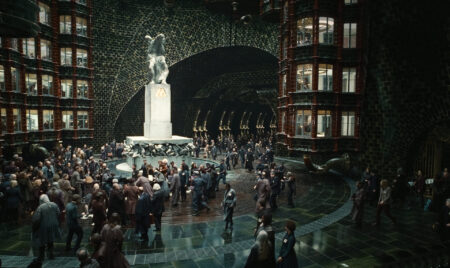When you like to think more about the apocalypse, these movies can be the best to add to your watch list.
The entire idea of the civilization-ending used to be a horror for people in the far future. We used to spend too much time worrying about it. But now, all it takes is a glance at a thermometer, or a peek at the news to realize the end is far closer than we believed.
Perhaps this is why apocalyptic TV dramas and films are so famous and popular right now. We’re not watching them for enjoyment; we’re looking for clues to our impending demise on the verge of extinction.
Every fictional picture of our doom serves a different function, from warning people against environmental calamities to scaring the wits out of us about the repercussions of genetic engineering and everything in between. Or simply ask us to envisage a world in which blindfolds are worn 24*7.
Avatar:
The Earth is rarely seen in James Cameron’s sci-fi epic Avatar, but the prologue foreshadows dire conditions: Warring private contractors have depleted the planet’s resources and scoured its areas.
The unspoilt paradise of Pandora’s moon is a Day-Glo combination of floating mountains and thick woods inhabited by lithe aliens who live in harmony with nature. So, when humans come, what do they do?
Conquer, loot, and blow everything up, repeating the errors that led them to seek new countries in the first place. Cameron’s movie became the country’s most significant box-office hit of all time despite making America the unambiguous lousy guy.
Snow piercer:
The film takes place in 2031 on a train with no fixed destination, and it simply orbits the world, protecting survivors from the consequences of a failed attempt to combat global warming. Snowpiercer, like Parasite, is a gripping thriller that skillfully juggles a range of tones and genres while addressing a host of socioeconomic themes.
While the affluent live in luxury, vibrant cars at the front of the train, Curtis (Chris Evans) and the others consigned to the back are forced to make do with drab accommodations and suspect food while living in continuous dread of being attacked by violent train personnel.
But enough is enough now. Curtis decides it’s time to start a revolution and makes his way towards the front of the train. He takes the audience from the gloominess and horrors of the back to an all-out brawl, a peaceful greenhouse, a disturbingly joyous classroom, and even beyond.
A balancing mix of sheer terror and dark humour challenges you to reconsider familiar social constructs and precisely what it means to be a commander.
WALL-E:
The 2008 Pixar classic imagines a future in which humankind has abandoned planet Earth due to the accumulation of garbage, trash, and waste everywhere. Humans currently live on a massive cruise ship in space.
Still, they have forgotten their origins—the only lives they remember are the ones they have now, in which computers programme their every move and their muscles have atrophied due to lack of usage.
WALL-E is certainly more realistic than we’d like to admit, but the film’s appeal stems from the fact that it’s a love tale between two robots who eventually team up to remind humans of their origins. When everything appears to be hopeless, there is still reason to be optimistic.
The Day After Tomorrow:
The film serves as a cautionary tale about the impact of climate change. It follows an American paleoclimatologist (Dennis Quaid), his coworkers, and his son as they try to warn government figureheads about an imminent upheaval in the North Atlantic Ocean circulation. The government authorities fail to adhere, and what the scientists predicted occurs, ushering in a new Ice Age.
The visual effects are fantastic, and Emmerich does a superb job of maintaining tension while depicting the repercussions of a catastrophic weather phenomenon on New York City. This film is the most exemplary reminder of yet another significant world-changing event that is destined to happen in addition to this whole pandemic stuff.
The Road:
The Road is one of the depressing movies ever filmed. It is set in a world that has been wrecked by a global calamity that has resulted in an extinction event, and it is based on the Cormac McCarthy novel of the same name.
A father (Viggo Mortensen) and son (Kodi Smit-McPhee) face cannibals, robbers, and their psyches as they try to find their way through this genuine wasteland. The Road is, in fact, a film about humanity’s deterioration in the aftermath of such a horrific occurrence. Who are the “good folks”, and who are the “bad guys” in this scenario?
Is it possible to be excellent in a society where food and shelter are scarce? What are the consequences of violence? The Road is a film that does not provide easy solutions and is not a feel-good film.
Matrix:
The Matrix, released in the incredible cinematic year of 1999, is still a smash hit. This picture merges myriad sources of philosophy, Eastern philosophers, Western investigative journalists, and popular culture into an accessible, entertaining, and intelligent blockbuster.
Keanu Reeves stars as Neo, a computer hacker who suspects there’s more to life than meets the eye, and he’s on the lookout for Morpheus (Laurence Fishburne) to take him deeper into the rabbit hole.
We don’t live in “the real world”; we live in “The Matrix,” a computer simulation meant to keep us entertained while terrible robots harvest our bodies for fuel.
As Neo, Morpheus, Trinity (Carrie-Anne Moss, who kicks off the movie with a kick heard ’round the world) and the rest of the modern-day H&M-wearing resistance fight Agents (led by Hugo Weaving) and decode cryptic prophecies and programmes, all kinds of boundary-pushing theories are explored amid crackerjack action set-pieces.
The film is also an internal struggle for the truth in one’s own identity, as well as a subconscious understanding that being reborn in who you indeed are will always be the solution. While the concepts of identity and transformation are important in work, love is the base upon which all ideas are built.
Shaun Of The Dead:
Shaun of the Dead is a refreshing addition in the crowded zombie sub-genre of the horror genre since it intends to amaze us at every turn. Pegg plays Shaun, a lackadaisical trapped in a dead-end job who is comfortable with his routine and safe habits. As he tries to guide his pals and family to safety, Shaun is immediately pushed to be a responsible leader, which he more or less rises to.
While most zombie films follow a group of survivors in quest of safety, Shaun of the Dead has a few essential characteristics that set it apart from the rest: Wright’s storyline, Pegg’s fantastic chemistry with Nick Frost, who plays Shaun’s closest buddy Ed, and Wright’s direction all contribute to the film’s success.












